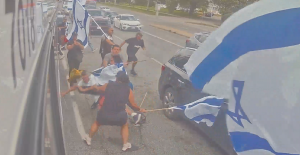Motherland, a new comic strip created by Torontonians Jonathan Rotsztain and Michael Rubenfeld about the latter’s experiences, begins with Rubenfeld’s attempt to mend his troubled relationship with his mother by traveling together to Poland to investigate their family’s roots.
But the comic, which debuts July 2 at the Krakow Jewish Culture Festival, takes an interesting turn: while attending Shabbat services at a synagogue in Krakow, Rubenfeld and his mother, who is the daughter of Holocaust survivors, meet a young Polish Jewish woman named Magda who offers to show Rubenfeld some of the city’s former Jewish sites.
The two hit it off and a romance blooms between them, culminating in the strip’s final scene, wherein Rubenfeld and Magda get married in a Krakow synagogue two and a half years after they met.
READ: WARSAW-BASED GROUP WORKS TO BRING JEWISH MEMORY BACK TO POLAND
“I had this theory that if my mother and I went to our family members’ hometowns and to Auschwitz it would bring us closer. But when we got to Poland, the thing that actually made us closer was spending time within contemporary Jewish culture there – there was something so moving about the hopefulness of Judaism happening again in Poland,” Rubenfeld explained.
Rotsztain, who illustrated the comic and Rubenfeld, who wrote it, will be appearing on a panel at the festival, which runs until July 5, to speak about Motherland and larger ideas about contemporary Jewish Poland.
Rotsztain, 31, is a cartoonist and graphic designer who grew up in Toronto and got his MFA at the Center for Cartoon Studies in Vermont.
He recently wrote and illustrated another comic called Self-Loving Jew, which was published this month on the Koffler Centre of the Art’s new digital platform, Koffler Digital, and explores what it means to be a secular Jew.
Rotsztain met the 37-year-old Rubenfeld, a playwright, director and producer at a Jewish artist retreat in Garrison, New York in 2015.
The two were the sole Canadians in the group and found that they share similar backgrounds: both Rotsztain and Rubenfeld are grandchildren of Polish Holocaust survivors and Rotsztain’s mother is from Winnipeg, where Rubenfeld grew up there.
They quickly launched into talk of collaboration.
“[Rubenfeld] was immediately interested in my comics and he already had this idea for Motherland. His story was interesting to me because it’s very parallel to mine…I don’t have the same intensity in my relationship with my [mother] but I share the legacy of being Holocaust-descended. From a young age, that has shaped my worldview,” Rotsztain said over the phone the morning he set out from Toronto to Poland.
After the retreat, Rubenfeld and Rotsztain began bouncing ideas back and forth.
Rubenfeld wrote a script for Motherland and the two discussed how Rotsztain could best create visuals to animate the story.
Rotsztain created dozens and dozens of thumbnail sketches and practiced drawing the scenes set in Poland, where he’d never previously been, from Google Maps and photographs he found on Google images.
Rubenfeld and Rotsztain received some funding for the project from the Polish Foreign Ministry and the Consulate General of Poland in Toronto, which helped them pay for translating the comic into Polish and printing it in both languages. They also received funding from the Charles and Lynn Schusterman Family Foundation.
Beyond telling the intertwining tales of Rubenfeld and his mother confronting their issues by uncovering family trauma and Rubenfeld finding love in Poland, Motherland aims to shift the notion that many Jews hold about Poland.
“The comic seeks to move forward beyond the narrative of Poland being a graveyard,” Rotsztain explained.
READ: COMIC BOOK HERO IS AN ORTHODOX JEWISH GIRL
Rubenfeld, who splits his time between Toronto and Poland and is also currently in Krakow to tour a play he’s working on, said that since the fall of Communism a long-silenced conversation about Poland’s rich Jewish past have increasingly sprung up amongst Poles.
Further, many who didn’t realize they were Jewish are discovering their families’ hidden Jewish roots.
“A lot of Polish people now are choosing to identify as Jewish but don’t know quite what it means…there’s a very young, very grassroots-y community growing…and a lot of learning to be done,” Rubenfeld said, stressing that focusing on the hopefulness of revived Jewish life in today’s Poland feels like “a much healthier engagement” with the country than simply focusing on the traumatic Jewish history.
Rubenfeld and Rotsztain hope to garner enough attention for Motherland to eventually turn it into a full-length graphic novel.









